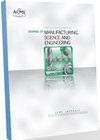Evaluation of Contrived Wear Methodology in End Milling of Inconel 718
IF 2.4
3区 工程技术
Q3 ENGINEERING, MANUFACTURING
Journal of Manufacturing Science and Engineering-transactions of The Asme
Pub Date : 2023-05-23
DOI:10.1115/1.4062603
引用次数: 0
Abstract
Tool wear plays a decisive role in achieving the required surface quality and dimensional accuracy during the machining of Inconel 718-based products. The highly stochastic phenomenon of tool wear, particularly in later stages, results in difficulty in predicting the failure point of the tool. The present research work aims to study this late-stage wear of the tool by generating consistent wear conditions and thereby decoupling the late-stage wear from the wear history. To do so, a multi-axis grinding operation is employed to create artificial tool wear that replicates the topology of natural wear occurring in the process. In order to evaluate the imitating ability of the proposed methodology, microscopic images in different wear states of naturally and contrived worn tools were analyzed. The methodology was validated by comparing the resulting process forces measured during end milling with the natural and contrived worn tool for different path strategies. Finally, a qualitative FE-analysis was conducted, and specific force coefficients for worn tool segments were determined through simulation.Inconel 718立铣削人为磨损方法评价
在加工以Inconel 718为基础的产品时,刀具磨损对实现所需的表面质量和尺寸精度起着决定性的作用。刀具磨损的高度随机现象,特别是在后期阶段,导致难以预测刀具的失效点。目前的研究工作旨在通过产生一致的磨损条件来研究刀具的后期磨损,从而将后期磨损与磨损历史解耦。为此,采用多轴磨削操作来产生人工刀具磨损,以复制加工过程中发生的自然磨损的拓扑结构。为了评估所提方法的模拟能力,分析了自然磨损和人为磨损工具在不同磨损状态下的显微图像。通过将立铣削过程中测量的过程力与不同路径策略下的自然磨损和人工磨损刀具进行比较,验证了该方法。最后进行定性有限元分析,通过仿真确定磨损刀段的比力系数。
本文章由计算机程序翻译,如有差异,请以英文原文为准。
求助全文
约1分钟内获得全文
求助全文
来源期刊
CiteScore
6.80
自引率
20.00%
发文量
126
审稿时长
12 months
期刊介绍:
Areas of interest including, but not limited to: Additive manufacturing; Advanced materials and processing; Assembly; Biomedical manufacturing; Bulk deformation processes (e.g., extrusion, forging, wire drawing, etc.); CAD/CAM/CAE; Computer-integrated manufacturing; Control and automation; Cyber-physical systems in manufacturing; Data science-enhanced manufacturing; Design for manufacturing; Electrical and electrochemical machining; Grinding and abrasive processes; Injection molding and other polymer fabrication processes; Inspection and quality control; Laser processes; Machine tool dynamics; Machining processes; Materials handling; Metrology; Micro- and nano-machining and processing; Modeling and simulation; Nontraditional manufacturing processes; Plant engineering and maintenance; Powder processing; Precision and ultra-precision machining; Process engineering; Process planning; Production systems optimization; Rapid prototyping and solid freeform fabrication; Robotics and flexible tooling; Sensing, monitoring, and diagnostics; Sheet and tube metal forming; Sustainable manufacturing; Tribology in manufacturing; Welding and joining

 求助内容:
求助内容: 应助结果提醒方式:
应助结果提醒方式:


